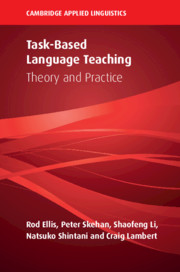Book contents
- Task-Based Language Teaching
- The Cambridge Applied Linguistics Series
- Task-Based Language Teaching
- Copyright page
- Contents
- Figures
- Tables
- Series Editors’ Preface
- Authors’ Preface
- Part I Introduction
- Part II Theoretical Perspectives
- Part III Pedagogical Perspectives
- Part IV Investigating Task-Based Programmes
- 10 Comparative Method Studies
- 11 Evaluating Task-Based Language Teaching
- Part V Moving Forward
- Endnotes
- References
- Index
10 - Comparative Method Studies
from Part IV - Investigating Task-Based Programmes
Published online by Cambridge University Press: 07 October 2019
- Task-Based Language Teaching
- The Cambridge Applied Linguistics Series
- Task-Based Language Teaching
- Copyright page
- Contents
- Figures
- Tables
- Series Editors’ Preface
- Authors’ Preface
- Part I Introduction
- Part II Theoretical Perspectives
- Part III Pedagogical Perspectives
- Part IV Investigating Task-Based Programmes
- 10 Comparative Method Studies
- 11 Evaluating Task-Based Language Teaching
- Part V Moving Forward
- Endnotes
- References
- Index
Summary
How effective is TBLT in comparison to more traditional approaches to language teaching? This chapter seeks an answer to this question by reviewing studies that have investigated the relative effectiveness of different approaches. Overall, these studies do point to the superiority of TBLT in a variety of instructional contexts – e.g. state schools in India and English-for-specific purpose courses in the USA – but there is a clear need for more studies. Comparative method studies are notoriously difficult to design and often suffer from design flaws so the chapter concludes with some guidelines for the design of future studies.
Keywords
Information
- Type
- Chapter
- Information
- Task-Based Language TeachingTheory and Practice, pp. 283 - 302Publisher: Cambridge University PressPrint publication year: 2019
